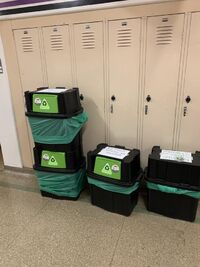It's Time To Go GREEN.
Mission
EDUCATE: We believe being educated consumers is important. That is why we provide consumers information on various certifications or “green stamps” they may find on products.
CONNECT: We believe connection leads to larger impact. We are connectors, bringing together pieces of the puzzle and making purchasing and consumption smoother on both fronts.
SUPPORT: We believe it's important to elevate and call out the incredible companies helping make the world just a little bit more greener with each alternative that is purchased through them.
E-CO Alternatives was started to EDUCATE consumers on sustainable consumption, CONNECT consumers to sustainable alternatives and SUPPORT environmentally conscious businesses.
What is Sustainability
The definition of sustainable has continued to evolve within the past 20 years, previously it was the "Green" direction but now its more encompassing. Sustainability for a company is also now a synonym with Corporate Social Responsibility (CSR) and Environmental Social Governance (ESG). These expanded definitions entail 4 main pillars; human, social, environmental and economic. For consumers, it isn't just about thinking green, its about thinking both environmental and socially to ensure the humans involved in operations are also taken care of both socially and financially as well as the communities that are involved either directly or indirectly by the production, sourcing or sales.
What Questions Should We Be Asking
Here are some initial guides of sustainable consumption thinking for as a consumer;
- Environmental: this is the impact the product has from cradle (sourcing of materials and ingredients) to grave (how it is disposed).
1) Where do the materials/ingredients come from? Try to get as local as possible but also take into account not all products are available locally, quality occasionally is higher farther away, financial barriers (especially for start ups or young companies).
2) How do you source? Do they look for sustainable practices, are their farms using regenerative farming practices, do they work on rehabilitation of land, do they only work with vendors with specific certifications (organic, FSC, SAC, etc) or do they just find what is the easiest or cheapest?
3) How is the product transported and from where? Again, sourcing local decreases transportation emissions and supports the local economy. In addition, boats are slightly better for shipping than air, specifically from a carbon perspective though sulphur rates are significantly higher with boats (boats tend to use bunker fuel- the lowest grade of fuel v air that uses the highest grade which is better for environment).
4) Where is the product made and what sustainability factors are in the manufacturing center or building?
5) How many times is the product packaged/repackaged?
6) What happens to waste from the production? What do you do with your waste from selling?
*This should be done for the product itself but also the packaging and any other byproducts
-Social: impact of a product on society, such as trading ethically or partnerships with the community.
1) Do you look for fair trade or fair for life or equivalence of fair livable wages when sourcing? Do you pay your team members fair livable wages?
2) What is the societal impact of your business or the sources of your supplies? Is it supporting the community or creating more hardship- what is the ripple effect in those local communities?
3) Do you partner with non profits or community groups? If so, which ones and how? What is the community impact?
4) What is your overall impact on the communities you work with and work for? (ie: Toms is a great company and provides free shoes for each pair bought however that then removes cobbler jobs in those areas as people can receive that product for free)
5) Are individuals being kept safe in their working environment? What is the labor environment like (overworking? no bathrooms? child labor?)

Resources
These are some handy resources we suggest using to learn more about sustainable consumption.
Sustainable Labeling:
Sometimes the label looks nice but what does it mean? Use this as a resource to understand what you are supporting. http://www.ecolabelindex.com/ecolabels/?st=country,us

About Us
Hi there, my name is Maddy, I'm from Denver, CO. Time after time, I have found myself spending hours of time researching sustainable and/or alternatives to regular purchases I make. I realized the effort and time was not always available which led to me purchasing unsustainable items for convenience. After talking to numerous friends, family and colleagues, I realized I was not alone. I wanted to create a way to increase efficiency and convenience for the consumer while supporting local and sustainable businesses in the area. That is how E-CO Alternatives was born.
This is a forever changing and adapting platform as we figure out better ways to promote sustainable consumption, raise awareness of these incredible companies in our backyard and educate consumers on what sustainable consumption guidelines are. We look forward to learning and growing with you to make this a larger community effort into a more sustainable future.
Contact Us
If you have questions, concerns or suggestions we would love to hear from you.